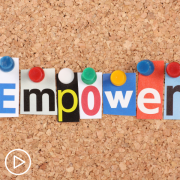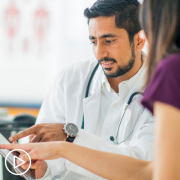Are Acute Myeloid Leukemia Patients at Risk for Secondary Cancers?
Are Acute Myeloid Leukemia Patients at Risk for Secondary Cancers? from Patient Empowerment Network on Vimeo.
With acute myeloid leukemia (AML) patients, are they at risk of secondary cancers or other complications? Watch as expert Dr. Catherine Lai explains potential medical conditions that can occur in patients and advice for patients to empower themselves for their best care.
See More from Best AML Care No Matter Where You Live
Related Resources:

|

Understanding High-Risk Acute Myeloid Leukemia Treatment Advances and Options |

|
Transcript:
Sasha Tanori:
AML patients, just like anyone else, want to live and live a very long time. Are AML patients at risk for secondary cancers, and are there any studies that speak on this?
Dr. Catherine Lai:
Yeah, so I would say everything has its risk and benefits at the time of diagnosis, you need the chemotherapy in order to get into remission, and then if you need the transplant, whether or not you’re getting radiation and then further some chemotherapy before the transplant, so that’s not without risks. So especially in a young patient, for example, in your particular case, you’re at risk for secondary treatment-related MDS and other bone marrow-related disorders that could occur, most patients who are in their 60s who, if they live long enough would be at risk, but most of those patients will die of something else before you have that opportunity. As a young patient, the other thing to be aware of, especially with, given that you’ve had transplant, is that the increased risk of cardiovascular effects, as well as making sure in patients who have had your whole body radiation, other effects in terms of their thyroid, lung function, and then screening earlier for other cancers. So in terms of looking at studies, we know that these risks are slightly increased and that monitoring starts a lot sooner, especially in young patients. So I think just being aware of what you need to do.
We also have a survivorship clinic, which I think is really important to help understand, You know what your risks are, because once your leukemia is in remission, we don’t want you to develop other medical problems, so it’s important just for patients to be educated so that they know how to take care of their body at each stage of their…again, of their journey



